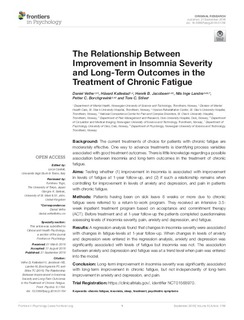| dc.contributor.author | Vethe, Daniel | |
| dc.contributor.author | Kallestad, Håvard | |
| dc.contributor.author | Jacobsen, Henrik Børsting | |
| dc.contributor.author | Landrø, Nils Inge | |
| dc.contributor.author | Borchgrevink, Petter Chr. | |
| dc.contributor.author | Stiles, Tore C | |
| dc.date.accessioned | 2019-01-30T09:44:01Z | |
| dc.date.available | 2019-01-30T09:44:01Z | |
| dc.date.created | 2018-10-02T10:51:27Z | |
| dc.date.issued | 2018 | |
| dc.identifier.citation | Frontiers in Psychology. 2018, 9:1764 1-8. | nb_NO |
| dc.identifier.issn | 1664-1078 | |
| dc.identifier.uri | http://hdl.handle.net/11250/2583019 | |
| dc.description.abstract | Background: The current treatments of choice for patients with chronic fatigue are moderately effective. One way to advance treatments is identifying process variables associated with good treatment outcomes. There is little knowledge regarding a possible association between insomnia and long-term outcomes in the treatment of chronic fatigue.
Aims: Testing whether (1) improvement in insomnia is associated with improvement in levels of fatigue at 1-year follow-up, and (2) if such a relationship remains when controlling for improvement in levels of anxiety and depression, and pain in patients with chronic fatigue.
Methods: Patients having been on sick leave 8 weeks or more due to chronic fatigue were referred to a return-to-work program. They received an intensive 3.5-week inpatient treatment program based on acceptance and commitment therapy (ACT). Before treatment and at 1-year follow-up the patients completed questionnaires assessing levels of insomnia severity, pain, anxiety and depression, and fatigue.
Results: A regression analysis found that changes in insomnia-severity were associated with changes in fatigue-levels at 1-year follow-up. When changes in levels of anxiety and depression were entered in the regression analysis, anxiety and depression was significantly associated with levels of fatigue but insomnia was not. The association between anxiety and depression and fatigue was at a trend level when pain was entered into the model.
Conclusion: Long-term improvement in insomnia severity was significantly associated with long-term improvement in chronic fatigue, but not independently of long-term improvement in anxiety and depression, and pain. | nb_NO |
| dc.language.iso | eng | nb_NO |
| dc.publisher | Frontiers Media | nb_NO |
| dc.rights | Navngivelse 4.0 Internasjonal | * |
| dc.rights.uri | http://creativecommons.org/licenses/by/4.0/deed.no | * |
| dc.title | The relationship between improvement in insomnia severity and long-term outcomes in the treatment of chronic fatigue | nb_NO |
| dc.title.alternative | The relationship between improvement in insomnia severity and long-term outcomes in the treatment of chronic fatigue | nb_NO |
| dc.type | Journal article | nb_NO |
| dc.type | Peer reviewed | nb_NO |
| dc.description.version | publishedVersion | nb_NO |
| dc.source.pagenumber | 1-8 | nb_NO |
| dc.source.volume | 9:1764 | nb_NO |
| dc.source.journal | Frontiers in Psychology | nb_NO |
| dc.identifier.doi | 10.3389/fpsyg.2018.01764 | |
| dc.identifier.cristin | 1617080 | |
| dc.description.localcode | Copyright © 2018 Vethe, Kallestad, Jacobsen, Landrø, Borchgrevink and Stiles. This is an open-access article distributed under the terms of the Creative Commons Attribution License (CC BY) | nb_NO |
| cristin.unitcode | 194,65,35,0 | |
| cristin.unitcode | 194,65,25,0 | |
| cristin.unitcode | 194,67,40,0 | |
| cristin.unitname | Institutt for psykisk helse | |
| cristin.unitname | Institutt for sirkulasjon og bildediagnostikk | |
| cristin.unitname | Institutt for psykologi | |
| cristin.ispublished | true | |
| cristin.fulltext | original | |
| cristin.qualitycode | 2 | |

